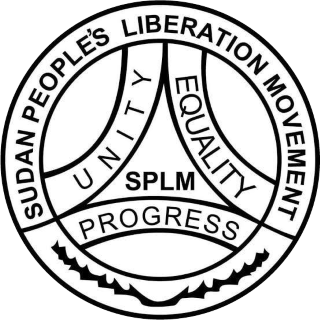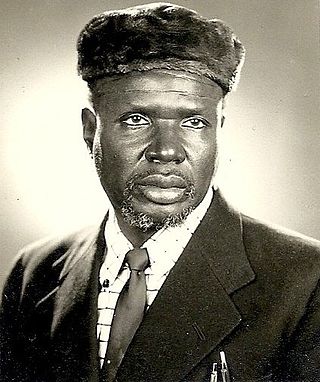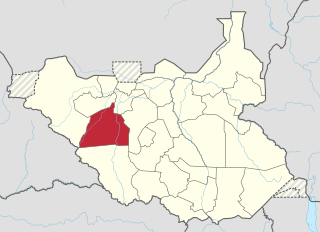Related Research Articles

Equatoria is the southernmost region of South Sudan, along the upper reaches of the White Nile and the border between South Sudan and Uganda. Juba, the national capital and the largest city in South Sudan, is located in Equatoria. Originally a province of Anglo-Egyptian Sudan, it also contained most of northern parts of present-day Uganda, including Lake Albert and West Nile. It was an idealistic effort to create a model state in the interior of Africa that never consisted of more than a handful of adventurers and soldiers in isolated outposts.

The Sudan People's Liberation Movement is a political party in South Sudan. It was initially founded as the political wing of the Sudan People's Liberation Army in 1983. On January 9, 2005 the SPLA, the SPLM and the Government of Sudan signed the Comprehensive Peace Agreement, ending the civil war. SPLM then obtained representation in the Government of Sudan, and was the main constituent of the Government of the then semi-autonomous Southern Sudan. When South Sudan became a sovereign state on 9 July 2011, SPLM became the ruling party of the new republic. SPLM branches in Sudan separated themselves from SPLM, forming the Sudan People's Liberation Movement–North. Further factionalism appeared as a result of the 2013–2014 South Sudanese Civil War, with President Salva Kiir leading the SPLM-Juba and former Vice President Riek Machar leading the Sudan People's Liberation Movement-in-Opposition.
Dr.Lam Akol Ajawin, is a South Sudanese politician of Shilluk descent. He is the current leader of National Democratic Movement (NDM) party. He is a former high-ranking official in the Sudan People's Liberation Army (SPLA), and subsequently became the Foreign Minister of Sudan from September 2005 to October 2007, when the Khartoum government offered the SPLA several other key ministries as part of a peace agreement.

Wau is a city in northwestern South Sudan, on the western bank of the Jur River, that serves as capital for Western Bahr el Ghazal. It lies approximately 650 kilometres (400 mi) northwest of the capital Juba. A culturally, ethnically and linguistically diverse urban center and trading hub, Wau is also the former headquarters of Western Bahr el Ghazal.
Anyanya II is the name taken in 1978 by a group of the 64 tribes of South Sudan dissidents who took up arms in All of Sudan. The name implies continuity with the Anyanya, or Anya-Nya, movement of the First Sudanese Civil War (1955-1972).

Lt Gen Dominic Dim Deng was a senior member of the Sudan People's Liberation Army, a distinguished military veteran general and the first defence minister in the Government of Southern Sudan who lost his life alongside his wife Madam Josephine Apieu Jenaro Aken, senior politician Dr. Justin Yac Arop and 18 other Sudan People's Liberation Army and Government of Southern Sudan officials on a leased CEM Air Beechcraft 1900 that crashed 375 km west of Juba, Sudan on May 2, 2008.

The South Sudan People's Defence Forces (SSPDF), formerly the Sudan People's Liberation Army (SPLA), is the army of the Republic of South Sudan. The SPLA was founded as a guerrilla movement against the government of Sudan in 1983 and was a key participant of the Second Sudanese Civil War, led by John Garang. After Garang's death in 2005, Salva Kiir was named the SPLA's new Commander-in-Chief. As of 2010, the SPLA was divided into divisions of 10,000–14,000 soldiers.

Josephine Apieu Jenaro Aken, a member of the Luo group from the Bahr el Ghazal area, was born in Wau, Western Bahr el Ghazal, South Sudan. She was a member of the Sudan People's Liberation Movement.

The States of South Sudan were created out of the three historic former provinces of Bahr el Ghazal (northwest), Equatoria (southern), and Greater Upper Nile (northeast). The states are further divided into 79 counties.

Gabriel Gatwech Chan, more commonly known by the nickname Tang-Ginye or Tanginye meaning "long pipe", was a Nuer and a commander in various primarily Nuer rebel militias in South Sudan. General Tanginye led a southern border militia allied to the Khartoum government during Sudan's civil war. Members of the Sudanese armed forces loyal to Tanginye in Malakal clashed with the Sudan People's Liberation Army (SPLA) in 2006, killing about 150 people, and in 2009 in breach of the peace deal. In April 2011, clashes between his militia and the SPLA in the state of Jonglei killed at least 57 according to government officials. Shortly thereafter, Tanginye surrendered to SPLA forces and was placed under house arrest in Juba awaiting charges against him. During the South Sudanese Civil War, he allied with the SPLA-IO and later Lam Akol's militia, a Juba linked rebel group called the National Democratic Movement (NDM) and became its chief of staff. In January 2017 he visited a NDM-allied group, the Tiger Faction New Forces, in the Hamra area in the northern Upper Nile. In course of this visit, the Tigers were attacked by SPLM-IO-affiliated fighters belonging to the militia of John Uliny, and Tanginye was killed alongside most of the Tigers.
Clement Wani Konga is a Mundari leader who fought in the Anyanya independence movement in the south of Sudan in 1969−72. He then joined the army of Sudan and rose to the rank of major general. In 2004 he made peace with the Sudan People's Liberation Movement (SPLM) and was appointed interim governor of Central Equatoria in South Sudan. In August 2015 he was dismissed from his post by president Salva Kiir Mayardit. He continued to be active as chairperson of the Mundari Community.
Samuel Aru Bol was a prominent politician in Southern Sudan. During the Second Sudanese Civil War (1983-2005) he signed the Khartoum Peace Agreement of 1997 as representative for the Union of Sudan African Parties (USAP).
Joseph Oduho Haworu was a leading politician from southern Sudan who was active in the struggle for independence and a founding member of the Sudan People's Liberation Movement (SPLM).
Ethnic violence in South Sudan has a long history among South Sudan's varied ethnic groups. South Sudan has 64 tribes with the largest being the Dinka, who constitute about 35% of the population and predominate in government. The second largest are the Nuers. Conflict is often aggravated among nomadic groups over the issue of cattle and grazing land and is part of the wider Sudanese nomadic conflicts.

Dr. Lawrence Lual Lual Akuei was a Sudanese politician born in Mathiang-Agor village of Ajak area into a family of spiritual leader Lual Akuei Lual of Pakuein Paan-Deng sub-clan of Agaal-Liil section.

Gordon Muortat Mayen Maborjok (1922–2008) was a South Sudanese veteran politician and an advocate for the rights and freedom of the South Sudanese people. He was the President of the Nile Provisional Government (NPG) which led the Anyanya; Southern Sudan's first armed resistance to Khartoum which started in 1955. Muortat also served as Vice-President of the Southern Front (SF) and Foreign Minister in the Southern Sudan Provisional Government (SSPG).

Wau State was a state in South Sudan that existed between 2 October 2015 and 22 February 2020. It was located in the Bahr el Ghazal region, and was part of the former state of Western Bahr el Ghazal. Wau State bordered Aweil State, Gbudwe State, Gogrial State, Lol State, and Tonj State.

Mabior Garang de-Mabior is a South Sudanese politician and activist and the eldest son of John Garang, the founder of the ruling party, the Sudan People's Liberation Movement.

Puot Kang Chol is a South Sudanese politician. Puot is currently the Minister of Petroleum in the Revitalized Transitional Government of National Unity (R-TGoNU) as of 2022. He is also a member of the Sudan People's Liberation Movement In-Opposition (SPLM-IO).
Professor Elias Nyamlell Wako is a South Sudanese academic and politician.
References
- 1 2 3 4 5 Kuyok, Abol Kuyok (2015). South Sudan: The Notable Firsts, Bloomington 2015. Bloomington: AuthorHouse. pp. entry "Joseph Ukel".
- ↑ Alier, Abel (1992). Southern Sudan – Too Many Agreements Dishonoured. Reading: Ithaka. pp. 2o1.
- ↑ Johnson, Douglas (2011). The Root Causes of Sudan's Civil Wars – Peace or Truce. Woodbridge: James Currey. pp. 84, 86.
- ↑ "Chronology January 16, 1989 - April 15, 1989". Middle East Journal. 43 (3): 455–505. Summer 1989. JSTOR 4327963.
- 1 2 "Electionnaire.org". Archived from the original on 2012-03-02. Retrieved 2017-07-13.
- ↑ "Al-Ahram".
- ↑ Johnson, Hilde (2011). Waging Peace in Sudan. Eastbourne: Sussex Academic Press. p. 101.
- ↑ Young, John (2012). The Fate of Sudan. London: ZedBooks. p. 160.
- ↑ "SudanTribune".
- ↑ "SudanTribune".
- ↑ "Rebecca Garang says not consulted before appointment into dialogue body - Sudan Tribune: Plural news and views on Sudan". www.sudantribune.com.
- ↑ Jale, Richard (4 August 2017). "Parliament Elects Members For East African Parliament" . Retrieved 6 November 2017.
- ↑ Peter, Malish John (Spring 2019). "Deliver Peace Through Power Sharing: A Comparative Analysis" (PDF). The Zambakari Advisory. p. 102.
- ↑ Vhumbunu, Clayton Hazvinei (11 February 2019). "Reviving peace in South Sudan through the Revitalised Peace Agreement - Understanding the enablers and possible obstacles". ACCORD. Retrieved 13 February 2020.
- ↑ Jackson, Opio (6 March 2019). "Wau regional conference recommends federalism". Juba Monitor. Retrieved 13 February 2020.
- ↑ "Veteran politician says 'barred' from leaving Juba". Radio Tamazuj. 27 September 2019.
- ↑ "Ukel allowed to leave Juba after confinement". Radio Tamazuj. 16 October 2019.